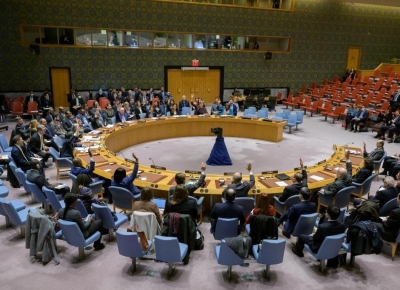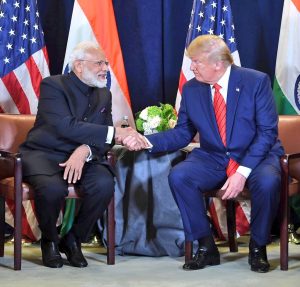The UN has repeatedly warned of the danger that the Oct. 7 attacks by Hamas on Israel and the war that has followed in Gaza could spark an escalation into a wider regional conflict….reports Asian Lite News
The UN on Monday repeated its call for all those involved in conflicts in the region to “step back from the brink and to consider the unbearable human and economic cost of a potential regional conflict.”
It warned that the Middle East remains “highly volatile,” and called for the development and implementation of a clear political road map designed to resolve the conflicts that rage there.
During a meeting of the Security Council to discuss the latest escalations in the region, including the US strikes on targets in Yemen, Syria and Iraq, the under-secretary-general for political and peacebuilding affairs, Rosemarie DiCarlo, once again called for an immediate humanitarian ceasefire in Gaza and for the unconditional release of all Israeli hostages held by Hamas.
The UN has repeatedly warned of the danger that the Oct. 7 attacks by Hamas on Israel and the war that has followed in Gaza could spark an escalation into a wider regional conflict.
Since the Hamas attacks there have been near-daily incidents in several countries, including about 165 attacks on US targets in Syria and Iraq, prompting Washington to launch retaliatory strikes in both countries.
On Jan. 28, a drone attack killed three American personnel and injured 40 at a US military outpost in northeastern Jordan. These were the first combat fatalities among US forces related to the current regional crisis.
Washington attributed that attack to the Islamic Resistance in Iraq, and President Joe Biden vowed the US would “hold all those responsible to account at a time and in a manner of our choosing.”
A few days later, US Central Command carried out 85 retaliatory airstrikes in western Iraq and eastern Syria, targeting sites used by Iran’s Quds Force, a branch of the Islamic Revolutionary Guards Corps. Washington said the attacks targeted command-and-control operations, intelligence centers and weapons facilities, and stressed it was not seeking a wider conflict in the Middle East or elsewhere.
Iran, Iraq and Syria condemned the attacks, which they said caused the deaths of 16 people in Iraq, including civilians, and 23 people affiliated with militias in Syria. Iraqi authorities summoned the US charge d’affaires in Baghdad and disputed a US claim that Washington had provided them with advance warning of the strikes.
Though the Iraqi government has reiterated that it remains committed to protecting US and other coalition forces in Iraq, DiCarlo said some armed factions linked to the “Islamic Resistance in Iraq have pledged to continue their attacks against US and coalition forces in the region.”
She told the Security Council that the wave of violence since early October has encompassed a large swath of the Middle East. She highlighted in particular the daily exchanges of fire across the blue line that separates Israel and Lebanon between the Israeli army and the Iran-backed Lebanese group Hezbollah.
She also expressed concern about ongoing drone and missile attacks by the Houthis in Yemen and the threat they pose to international shipping in the Red Sea. She said they risk “exacerbating the conflict and further impacting international trade, as companies divert ships away from critical maritime routes.”
The US and UK have been launching strikes on Houthi positions in Yemen since Jan. 11. In the past three days alone, they hit more than 36 targets at 13 locations, including what were described as command-and-control sites.
Russia’s permanent representative to the UN, Vassily Nebenzia, accused Washington of deliberately stoking the conflict in an attempt to expand it to some of the biggest countries in the region, as he called on the international community to condemn the “senseless acts of Washington and its allies in the Middle East.”
ALSO READ: Biden’s ‘Irish Temper’ Flares Over Trump’s Remarks






